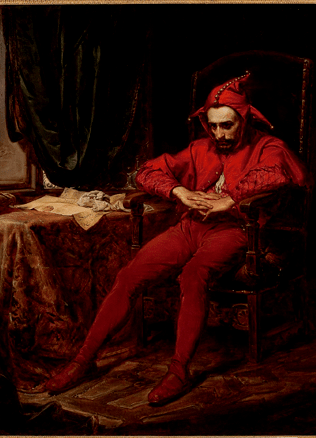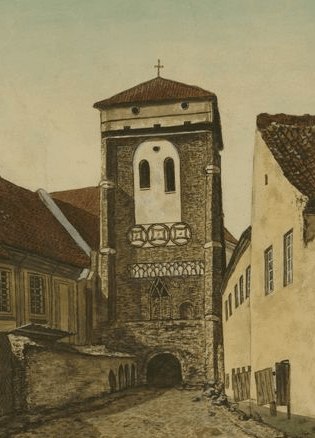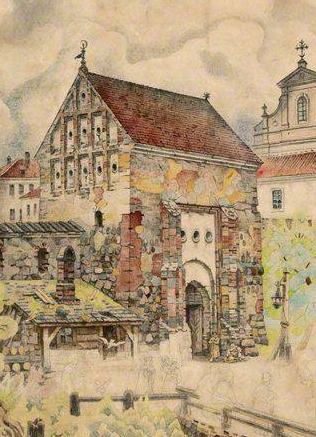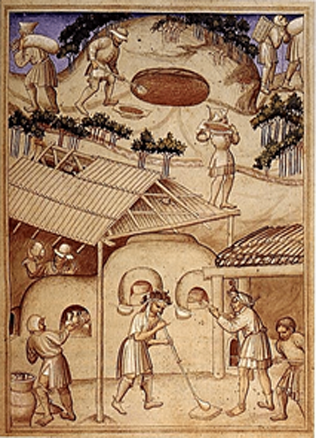Humanist and Adventurer Joannes Jacobus Basilicus Heraclides Despota (1511-1563)
Famous 16th century Greek swashbuckling adventurer Joannes Jacobus Basilicus Heraclides Despota (also known as Iacob Heraclid, Despot Vodă, and Marchetios) was a colourful Renaissance figure, and important figure of the Greek humanist movement and the European Reformation. He was the ruler of the Grand Duchy of Moldovia, which was dependent upon Turkey and Poland (1561-1563). In addition, Jacobus Basilicus Heraclides Despota was in the GDL for almost all of 1557 and participated in the Livonian military campaign.
Who was Joannes Jacobus Basilicus Heraclides Despota?
His origins are unclear. According to some authors, he was the son of a fisherman, born on the island of Crete or Samos. He was adopted by Jacobus Heraclides, the Despot of Paros, Samos and other islands of the Aegean Sea. He proclaimed that he was the descendent of Byzantine emperors.
His royal origins and title of despot was recognized by Holy Roman Emperor Charles V, giving him the right to crown famous poets and imperial notaries in the name of the emperor.
He studied in the school of mathematician and doctor Hermodor Lesterchos on the island of Chios, later went to Brussels, studied medicine in Montpellier, and participated in the Italian War (1551-1559) in the battles of the Habsburgs against France. He created close ties with the emperor, who due to political considerations – the war against Turkey – supported the above-mentioned genealogical and political claims. He converted from Orthodoxy to Lutheranism in Wittenberg. He was an educated man, an extraordinary orator and polyglot – he knew Greek, Latin, French, Italian and German, published a manual on military strategy, in which he described the Battle of Renty in 1554. He communicated with figures of the Reformation and Humanism such as Philip Melanchthon and Caspar Peucer, among others.
The road to glory went through Lithuania
Supported by the Habsburgs and reformers, he planned an uprising in the Balkans, and wanted to free Greece from the Turks. The Greek Despot strove to conquer Wallachia and Transylvania and push the Turks out of Europe and be crowned the emperor in Constantinople. He chose Moldova for implementing his plans, the road to which led him through the GDL and Poland.
At the beginning of 1557, he was at the estate of Duke Albert of Prussia in the capital Königsberg. Until the end of his life, as a Lutheran and follower of the Habsburgs, he used the benevolence as well as financial and military support of this leader.Albert recommended Despot to King Sigismund Augustus and Vilnius Voivode Mikołaj Krzysztof Radziwiłł the Black. On March 23rd, 1557 in a letter written by Despot, he thanked Duke Albert and informed him that he was accepted into the service of the ruler, and he was given 300 thalers and a horse. Sigismund Augustus promised to send him as an envoy to Turkey concerning the liberation of his homeland (the island of Samos), and was overjoyed with the help of Vilnius Voivode Radziwiłł the Black. In Vilnius, Despot was in contact with the controversial Arian and burgomaster Lukasz Markovicz.
Having declared his noble aim of liberating his occupied homeland, the island of Samos, and even all of Greece from the yoke of Muslim Turkey, he secured the support of the Christian ruler and voivode as well as Protestant nobles.
He also participated in the beginning of the Livonian war, i.e. in August and September 1557 in what is known as the Pasvalys campaign. During it, he wrote and sent Albert a manuscript of a book called De disciplina militaris.
A viper hiding close to the ruler’s bosom
Despot spent a few months in the GDL capital, and was in contact with GDL protestants, as well as Jan Laski (1499-1560), who had come to Vilnius on March 17th, 1557. It may be that specific Moldovian plans became ripe in Vilnius, because Hungarian and Polish noble Albert Laski (1533-1597), who late became an influential supporter of Despot, was a relative of Jan Laski. Despot also became acquainted with Jan Łasicki, who was well informed about his further fate. Using the right bestowed upon him by the emperor, Despot bestowed the title of poeta laureatus upon Cyprian of Sieradz (~1535-1600), who was a former civil servant of the king’s chancery, a writer, translator, publisher, Evangelical reformer, and musician of Radziwiłł the Black’s manor estate who was from Sieradz. Despot adopted him into his family and his coat-of-arms. From that time forth, the coat-of-arms of Bazylik Cyprian Heraclides was known as the Bazylik. He was bestowed with nobility and the title poeta laureatus on September 1st, 1557 at a camp near the River Mūša by Sigismund Augustus.
Do You Know?
Jacobus Basilius Heraclides Despot, who was one of the most famous adventurers of the 16th century, visited Lithuania in 1557. Using the right given to him by the emperor, he gave the title poeta laureatus (a title bestowed upon famous poets in the name of the emperor) Cyprian of Sieradz (1535-1600), who was a former civil servant of the king’s chancery, a writer, translator, publisher, Evangelical reformer, and musician in the manor estate of Radziwiłł the Black, who came from Sieradz. Despot welcomed him into his family and coat-of-arms, and from then on he was named Bazylik Cyprian Heraclides of the Bazylik heraldic family.
Despot left Vilnius at the end of 1557. He was in Krakow at the beginning of 1558 at the latest, and in the spring went to Moldova on the pretext of familial ties with Ruxandra, the wife of tyrant Alexandru Lăpușneanu III, who was the ruler of Moldova (1552-1561, 1563-1568), and entered military service. Sigismund Augustus and Radziwiłł the Black, who at the time did not suspect Despot of having plans to overthrow the voivode, who was loyal to Poland, even wrote letters of recommendation to the Moldovan ruler. At the beginning, Despot justified his supporters’ hope, and organized a military expedition to Greece. He even received a letter from Duke Albert that showed the duke’s support for him. However when Despot got involved in the conspiracy against ruler Alexandru Lăpușneanu III, Sigismund Augustus tried to thwart his plans in any way possible and with reason considered him to be an agent of the Habsburgs who was fighting against the Moldovan ruler, who was a supporter and vassal of Poland.
However, after victory in the Battle of Verbia on November 10th, 1561, Despot became the ruler of Moldova.
Sigismund Augustus had to come to terms with this fact and the usurper.
The reforms in Moldova cost Despot his head
Joannes II Jacobus Heraclides Despot (also known as Iacob Heraclid and Despot Vodă) became the first Protestant ruler in Europe, who due to his anti-Turkish plans was supported by the Habsburgs and even short-sighted Turkey (for an enlarged tribute).
He attempted to introduce the Lutheran faith in an Orthodox country, and expropriated the Orthodox churches’ gold and silver, which he used for minting gold and silver coins in Suceava. This angered the Orthodox believers. He was forced to introduce a new tax for the tribute to Turkey and wages for hired mercenaries (which caused an uprising), pushed out the local nobles, and in the place of old customs and privileges introduced innovative law that was supported by foreign advisors from Hungary, Saxony, and Poland. In 1562 he founded a Latin academy in Cotnari, where protestants from Hungary and Saxony studied. He kept a library and planned to marry a foreigner.
An uprising started in May 1563. Despot hid in Suceava Castle, however after the three month-long siege that was led by noble and future Moldovan leader Tomşa, he was betrayed and killed on September 9th. He was brought to the place of execution on a wonderful steed with a crown and sceptre in his hands. Nobleman Tomşa called him a “dog,” “tyrant,” and “sacrilegious,” beat him with a stick and ordered that his head be cut off (though he was already dead). The head was stuffed with hay and put on a spear (afterwards it was sent to Constantinople), while the body was buried in cemetery of a monastery near Suceava.
Literature: Vilniaus burmistro Luko Markovičiaus „Mundijaus“ kalbos, laiškai ir kiti raštai (1551–1584), sudarė Aivas Ragauskas, Raimonda Ragauskienė, Vilnius, 2010, p. XXVIII-XXXIII.
Aivas Ragauskas



